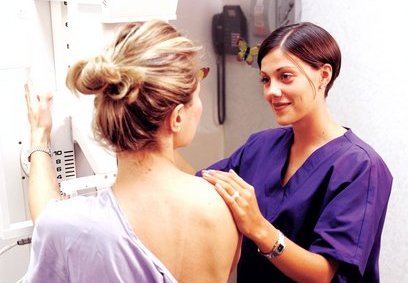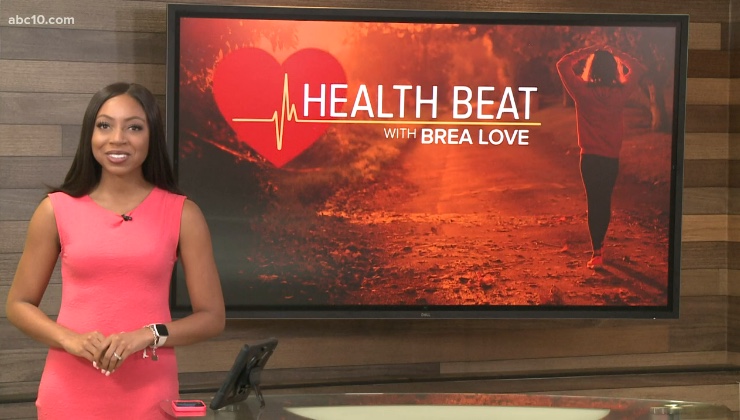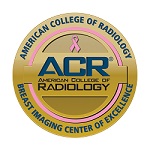Please call 916-734-0655 to schedule your appointment. All mammography exams are done by appointment only. More information about scheduling
Breast Cancer Screening Guidelines

The American College of Radiology (ACR) and the Society of Breast Imaging (SBI), along with our experts at UC Davis Health, recommend routine annual screening for women at average risk starting at age 40.
Women with specific risk factors may start earlier than age 40. You should discuss your individual screening options with your doctor.
Breast Cancer Screening Recommendations
- By Age 25: All women, especially minority women, should have a risk assessment by age 25 to determine if they are in a higher-risk category. Discuss with your doctor whether screening earlier than age 40 is needed.
- Starting At 40: Annual screening is your best defense against breast cancer. A yearly mammogram for women 40 and older is going to detect the most number of cancers earlier: when they’re at their smallest sizes, are the most treatable, and have a higher rate of survival.
- Age 75+: There is no recommended age at which you should stop receiving annual mammograms. Indeed, breast cancer screening in women ages 75 years and older has continued benefits in terms of deaths averted and life-years gained. You and your doctor can decide on the right age to stop screening based on your personal preferences and overall health.
Risk Factors and High-Risk Groups
Factors linked to a high risk of breast cancer include:
- Certain genetic mutations
- Family history of breast cancer
- Personal history of breast conditions, including previous breast cancer diagnoses
- Race and Ethnicity: While white women are slightly more likely to develop breast cancer than Black, Hispanic, and Asian women, Black women are more likely to develop more aggressive, advanced-stage breast cancer that is diagnosed at a young age.
- Having dense breast tissue: Research has shown that breast density elevates your risk of breast cancer—partly because dense breasts are more difficult to screen using traditional mammography.
Talk with your health care provider about your risk of breast cancer to make informed decisions about the best breast cancer screening options for you.
Know Your Breast Density
Breast density is a measure of how much fibrous/connective and glandular tissue there is in your breast, as compared to fat tissue. It isn’t related to breast size or firmness.
Having dense breasts/high breast density is normal—in fact, around 50% of women aged 40 and over have dense breasts.
Knowing whether you have dense breasts is important because:
- Dense breasts can make it harder to detect cancer. Mammograms don’t always reveal cancers that may be present in dense breasts. Small cancers can be hidden by dense tissue, since both appear white on a mammogram. This increases the risk that cancers may be missed, particularly during the early stages when most treatable.
- Women with dense breasts have a higher risk of developing breast cancer compared to women who don’t. The greater the amount of dense tissue, the higher the risk. However, you don’t necessarily have a high risk of breast cancer *just* because you have dense breasts.
 If you have dense breasts, your health care provider may suggest other types of breast imaging in addition to regular mammograms. Breast specialists often recommend such supplemental screenings as breast ultrasound, contrast enhanced mammography, and breast MRI. These supplemental screening tests can help detect cancer early and save lives.
If you have dense breasts, your health care provider may suggest other types of breast imaging in addition to regular mammograms. Breast specialists often recommend such supplemental screenings as breast ultrasound, contrast enhanced mammography, and breast MRI. These supplemental screening tests can help detect cancer early and save lives.
Breast density is one piece of the puzzle in thinking about your breast health and breast cancer screening plan. While dense breasts are normal, knowing your density and the risks associated with dense breasts ensures you can have an informed discussion with your doctor and create a screening plan that works best for you.
Transgender Individuals
For average-risk transgender patients, recommendations depend on sex assigned at birth, hormone use, and surgical history. Annual screening at age 40 is recommended for transfeminine (male-to-female) patients who have used hormones for ≥5 years, as well as for transmasculine (female-to-male) patients who have not undergone mastectomy.
How do I Schedule my Appointment?
You can schedule your yearly exam without a doctor’s referral. Please call 916-734-0655 to schedule your appointment.
Resources:
- SBI Recommendations and Position Statements
- Journal of the American College of Radiology
- American College of Radiology ACR Appropriateness Criteria® Transgender breast cancer screening. ACR, Reston, Virginia 2021





